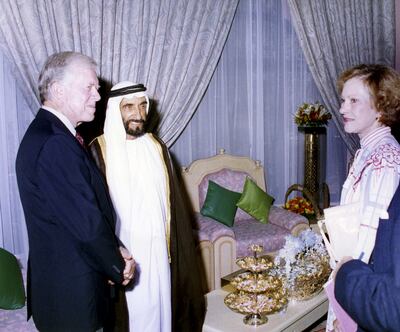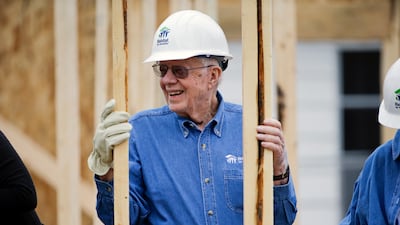News that former US president Jimmy Carter made the decision to go into hospice last month generated a flood of appreciative commentary about his life and work. It is important to reflect on both.
When he lost his reelection bid to Ronald Reagan in 1980, many deemed his presidency a failure. Inflation was at record highs, consumer confidence was at an all-time low, and Americans, still recovering from our humiliating defeat in Vietnam, were being traumatised anew by the prolonged captivity of US embassy staff held hostage in Iran. The criticisms were largely unfair, since the problems Mr Carter confronted were not of his making and were beyond his ability to control.
While most former presidents have either capitalised on their fame or faded into obscurity, Mr Carter chose a different path. He made the conscious decision to invest his prestige in doing work for others through public service.
For example, almost immediately upon leaving the White House, Mr Carter and his wife, Rosalynn, embraced and became closely identified with Habitat for Humanity, a non-profit volunteer project that builds low-income housing and repairs homes in areas hit by natural disasters. They volunteered in building projects and gave a public face to the group that, during their association with Habitat, built more than 100,000 homes for over one and a half million people. Even into their 70s, Mr and Mrs Carter were devoting at least one week a year to Habitat projects. He became so identified with the group that when thinking of him more Americans probably called to mind Mr Carter in denim with hammer in hand than Mr Carter in a suit in the White House.
In 1982, the former president launched the Carter Centre that described its role as “waging peace, fighting disease, and building hope”. Leading many of the Centre’s initiatives, he travelled the globe monitoring elections, negotiating peace in troubled areas of the world and launching programmes to help eradicate diseases or providing expertise to farmers to increase yield and improve their lives.
I had the great fortune to get to know Jimmy Carter. Among the most memorable of those encounters was a lengthy interview I had with him about his life and his views on a range of Middle East topics and the opportunity to speak alongside him on a panel at the Carter Centre on Israel’s treatment of Palestinian Christians.
The Carter I encountered in my dealings with him validated the image the public had grown to know and love about this man. He was humble, honest and thoughtful. He accepted blame and deflected praise.
In our first meeting, I told him how I had hired a pilot to fly one night around Camp David while he was meeting Israeli and Egyptian leaders there. The pilot, careful to remain outside the restricted perimeter of the area, carried a lit sign that read “Palestinians are the key to peace”. When I told him this, he smiled and said: “That was you! I wondered who did that. It was an important reminder.” He went on to describe his frustration that he hadn’t been able to deliver more for Palestinians and noted the pushback, both domestically and in Israel, he received for his efforts. (He had written much the same to me in a letter he sent to me in 1980 before leaving the White House.) He was also critical of the extent to which the US had continued to “look the other way”, allowing the Israelis to deepen the occupation and further impede any hope for a just peace.

In further conversations, while acknowledging that former Iraqi president Saddam Hussein was “a callous and inept leader”, he was deeply critical of the US-led sanctions regime that he noted had contributed to the deaths of hundreds of thousands Iraqi children. He called the sanctions “counterproductive”, saying that they played into the hands of the regime.
Most revealing of the character of the man was his response to me when, in an interview, I complimented his work in fighting disease in Africa. He deflected the praise and said that while the accolades were given to the Carter Centre, if it hadn’t been for the support given by the UAE Founding Father, the late Sheikh Zayed bin Sultan Al Nahyan, much of their work in Africa could not have been done.
It is with these characteristics of humility, honesty, and thoughtful self-reflection and criticism, that Mr Carter has established his well-earned reputation as “America’s greatest ex-president”.
With the announcement that Mr Carter would enter hospice, I was reminded of a quote from a talk he gave to his church in 2019. He said: “I didn’t ask God to let me live, but I asked God to give me a proper attitude towards death. And I found that I was absolutely and completely at ease with death.”
This is his legacy. A great former president who taught us how to live a life for others and, as he approaches his end, is teaching us how to die with grace. His has been a life well-lived.



















